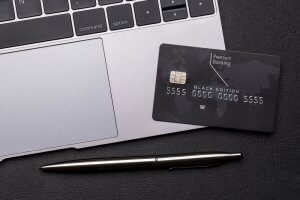Last Updated October 8, 2025
Lenders rely on credit scores to determine your creditworthiness. When you run a business, understanding the difference between business credit vs. personal credit can make or break your financial health.
Common questions arise when considering this difference, such as, does a business credit card affect personal credit? And do you need personal credit to get business credit? In this guide, you’ll learn how to build both types of credit, how they’re different, and how to keep business and personal expenses separate.
Key Takeaways
- Business and personal credit are separate, with different identifiers, bureaus, and scoring systems.
- Personal credit can affect early business financing through guarantees or checks.
- Keeping finances separate protects assets, simplifies bookkeeping, and builds both credits.
- Business credit can be built over time, even if personal credit is weak.
What Is Business Credit?
Business credit is a score that measures your company’s creditworthiness. It’s a separate score from your personal credit, which reflects your individual financial history.
One of the biggest business vs. personal credit differences is that this number is tied to your business, usually through a taxpayer identification number (TIN) like an employer identification number (EIN). Since the two scores are separate, it’s possible to have good personal credit and low business credit, and vice versa.
Both lenders and vendors may check your business credit score before doing business with you. If you make solid financial decisions for your business over time, you’ll have a better score. It can take two years or longer, but getting a good business credit score can unlock small business growth through better financing terms and higher credit limits.
But is business credit tied to personal credit?
Sometimes, but not always. Lenders might ask for a personal guarantee, even on loans taken out for a business, but this is most common when you have limited business credit history. In that situation, your personal credit could still play a role in whether your business gets financing or not.
How to Establish Business Credit
Just like your personal credit score, you’ll need to take a few deliberate steps to build a good business credit score. It doesn’t happen overnight, but you can start building business credit by:
- Officially registering your company and obtaining an EIN
- Opening a dedicated bank account only for business accounting
- Working with vendors that report payment history to business credit card bureaus
Many lenders will ask for your personal credit score in the early days of your business, especially if the company doesn’t have credit yet. That’s normal. However, as your business builds more credit history, you can rely less on personal creditworthiness and more on the strength of your company’s track record.
What Is Personal Credit?
Personal credit is a record of your individual financial history that’s tied to your Social Security number (SSN). If you’ve ever applied for a loan, credit card, or even an apartment lease, you’ve already seen how important it is to have decent personal credit.
As an entrepreneur, you need solid credit to grow a new business. Lenders often want reassurance that you can handle personal debt before extending funding to your business. If you’re planning on going into business for yourself, expect lenders to ask you to offer a personal guarantee on business loans.
How to Establish Personal Credit
Starting with little or no credit history can feel intimidating, but building credit is quite simple—it just takes time. Just like you can learn how to establish business credit, there are clear steps to build personal credit from the ground up:
- Open a credit card in your name and pay it off in full each month. If this isn’t possible, at least commit to paying the minimums.
- Put your name on utility accounts, like your water, phone, or electricity bill.
- Diversify your lines of credit. Consider taking out an installment loan, like a car loan, or a revolving account, like a credit card.
- Check your personal credit score for free through the official government website.
Ultimately, lenders want to see that you can make payments on time and avoid carrying high balances. Still, it takes years to build credit history, so be patient.
What Are the Differences Between Business Credit vs. Personal Credit?
At first glance, credit may seem like credit, but once you start comparing business credit vs. personal credit, there are some big distinctions. Understanding business vs. personal credit differences is key to knowing how lenders, vendors, and partners will evaluate you.
| Category | Personal Credit | Business Credit |
| Reporting Bureaus | Equifax, Experian, TransUnion | Equifax Business, Experian Business, Dun & Bradstreet (DNB) |
| Scores | Range from 300 to 850 | Range from 0 to 100; different scoring scales, not directly comparable to personal credit |
| Unique Identifiers | Social Security Number (SSN) | Employer Identification Number (EIN); sometimes personal SSN required for filings or loans |
| Legal Protection | You are personally liable for debts | LLC or corporation can provide limited liability; debts are generally tied to the company; early-stage loans may require a personal guarantee |
Reporting Bureaus
One of the biggest differences between business credit vs. personal credit is which bureaus keep tabs on your financial history. Consumer bureaus like Equifax, Experian, and TransUnion power personal credit reports. Business reports, on the other hand, rely on Equifax Business, Experian Business, and Dun & Bradstreet (DNB).
Scores
Business and personal credit scores aren’t quite the same. Personal credit scores typically range from 300 to 850, while business credit scores usually run from 0 to 100. The business bureaus follow their own scales, which is why an apples-to-apples comparison between personal and business scores isn’t always possible.
Unique Identifiers
For personal credit, your Social Security number is the unique identifier. For business, it’s usually your EIN. Keep in mind that some business filings or loans may ask for your personal SSN, so you may need to provide both identifiers in some cases.
Legal Protection
Liability is one of the most important reasons to separate business and personal finances. With personal credit, you’re on the hook for any debt. With business credit, especially if you’ve formed an LLC or corporation, you may have limited protection. This means business debts are tied to the company rather than you personally. However, in the early stages, lenders often ask for a personal guarantee, which is one of the few situations when personal and business credit intersect.
How Business Credit and Personal Credit Influence Access to Capital
Lenders are understandably wary of extending loans, and they rarely look at just one credit score to make a decision. Both business and personal credit scores can influence how much your business can borrow, as well as approvals and terms.
Risk Assessments
Lenders use credit to measure risk. A strong credit score tells banks that you’re more likely to manage repayment responsibly. For example, if you apply for an asset-based loan like equipment financing, lenders will look at both the value of the equipment and your credit scores before approving the loan.
Interest Rates and Fees
Credit scores don’t just determine approval; they affect costs. If your personal credit is weak, even a good business profile may not shield you from higher interest rates. Similarly, if your business credit report shows late payments, your company may face higher fees.
Lenders will look at your personal credit score even if you’re applying for business loans. That’s why it’s crucial to strengthen both of your credit scores before applying for financing. Not only are you more likely to be approved, but you’ll also get better interest rates, fees, and terms with a higher score.
Loan Approval Chances
It’s possible to get a small business loan with bad credit, but it could hurt your loan approval chances. The stronger your credit—personal and business—the better your odds of securing financing. Over time, establishing business credit separate from personal credit improves your chances of approval without leaning so heavily on your individual track record.
If you’re just getting started and need funding, it could be difficult to move forward if you have a lower score. In this case, many startup founders look at alternative lending to bridge the gap while they improve their credit scores.
Personal Guarantees
Even if you’ve kept your business and personal credit separate, many lenders will still require a personal guarantee. This means if your business can’t repay a loan, you’ll be personally responsible.
The Importance of Keeping Personal and Business Expenses Separate
One of the most common mistakes new entrepreneurs make is blending their finances. If you’re serious about building credit and protecting yourself legally, you need to know how to keep business and personal expenses separate. Separation simplifies bookkeeping, protects your personal assets, and strengthens both credit profiles.
In practice, this means that you need a separate credit card for personal and business expenses. While many businesses fail due to ineffective cash flow management or debt management, using personal and business credit cards responsibly for their intended purposes can help you build both scores over time.
Can You Build Business Credit With Bad Personal Credit?
Yes, you can start a business with poor personal credit, but it takes time and effort.
While you can get a business credit card with bad credit, you’ll likely be applying for a secure card with a personal guarantee and less favorable terms.
Fortunately, you can establish business credit even if your personal score isn’t great. By registering your company, opening accounts under your EIN, and working with vendors that report to business credit bureaus, you can build business credit even if your personal score is less than perfect.
How to Improve Your Business Credit
It takes around two years to build a solid business credit profile. However, you can take action today to quickly start improving your business credit:
- Choose the proper business structure (LLC, corporation, or sole proprietorship) for your company.
- Establish credit with suppliers who report to business credit bureaus.
- Sign up for a business banking account and build a relationship with your bank.
- Get a business credit card and pay it off consistently.
In-Summary: Business Credit vs. Personal Credit
Breaking down the differences between business credit vs. personal credit will help you conform to lenders’ requirements while improving both of your scores over time. While they serve similar purposes, these scores have different reporting bureaus, scoring systems, and legal protections.
The reality is that while lenders often require personal guarantees in the beginning, your company can—and should—develop its own profile over time. That’s why it’s crucial to separate business and personal expenses, use a company credit card for business expenses, and keep your business and personal credit separate. By strengthening both of your scores, you’ll have more access to capital, better terms, and financial protections while growing your business.
Business Credit vs. Personal Credit FAQs
Does personal credit affect business credit?
Business credit is generally separate from personal credit. However, if you just started a business and don’t have history yet, lenders may look at your personal credit score or ask for a personal guarantee. Otherwise, lenders and bureaus typically treat business vs. personal credit as two different systems.
Does a business credit card affect personal credit?
It depends. A business card that reports only to business bureaus will not affect your personal score. But if the card requires a personal guarantee, it may show up on your consumer report.
Can you get a business credit card with bad credit?
Yes, but you will have limited options. Some issuers offer secured business credit cards or require higher fees. Over time, using a business card responsibly (even if you have poor personal credit) will steadily improve your business credit.
Do you need personal credit to get business credit?
Yes, especially as a new business, you need personal credit to get business credit. Lenders will check both scores to see if you’re a responsible borrower. However, if your company has more credit history and a higher score, lenders will rely on that score more than your personal credit profile.
Michael McCareins is the Content Marketing Associate at altLINE, where he is dedicated to creating and managing optimal content for readers. Following a brief career in media relations, Michael has discovered a passion for content marketing through developing unique, informative content to help audiences better understand ideas and topics such as invoice factoring and A/R financing.










